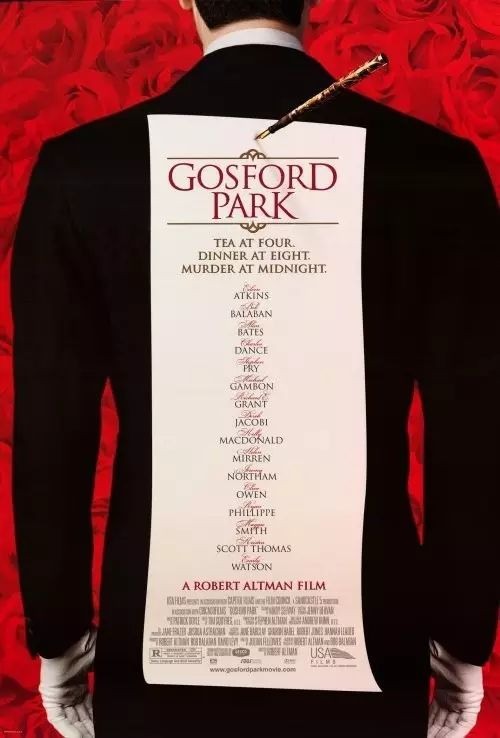Gosford Park (2001)
An original take on a murder mystery is a rare thing, with many films and TV shows preferring to stick to adapting Christie’s novels over and over again (Murder on the Orient Express, for instance, has been adapted for film and TV more than once). However, there is one film that, like Knives Out, proudly takes inspiration from Christie’s works while still attempting to tell an original story that puts a new spin on the familiar tropes. That film is Robert Altman’s Oscar-winning Gosford Park.
Set in 1932, Gosford Park follows a gathering of wealthy British aristocrats, an American film producer and their servants as they meet for a hunting party on a large country estate. However, after one particularly ill-tempered dinner party, a murder occurs with the investigation uncovering many long-buried secrets.
Now to go through this film’s cast would be a to go through a roll call of a some of Britain’s finest actors. We have *deep breath* Helen Mirren, Derek Jacobi, Michael Gambon, Clive Owen, Richard E Grant, Kristen Scott Thomas, Kelly MacDonald, Emily Watson, Charles Dance, Tom Hollander and Maggie Smith, among many many others.
With such a large cast of such brilliant actors who on their own are well worth a watch, it would be near impossible to go through each performance and pick what about their respective performances are so brilliant. However, if I had to single out anyone for praise it would be Maggie Smith for her wonderfully fun performance as Lady Trentham, a catty old aristocrat who loves nothing more than to hear bits of gossip about her fellow guests, while also being rather blunt in her disapproval of things like the songs of Ivor Novello and motion pictures starring Ivor Novello.
While Gosford Park is a murder mystery drama, the bulk of the film focuses on issues such as class, mainly to do with the contrasting personalities and attitudes between the upper class aristocrats who enjoy an evening of wining and dining “above stairs”, with the often tedious and tiresome work of their servants residing “below stairs”.
It’s enormously entertaining watching the supposedly civilized and cultured aristocrats struggling to act like they enjoy each other’s company while regarding each other with deep-seated often barely hidden contempt and derision, with more than a few backhanded barbs flying back and forth across the dining table.
The “below stairs” staff that tends to the wealthy above, by contrast, are open in with each other, sharing laughs as they mock their employers and share the gossip they have learned from them, with the various valets and butlers often acting as unofficial informants for their lords and ladies. However, while the servants and their masters might seem different on a surface level, the film suggests that underneath they are more alike than they might admit, with them dealing with the same prejudices, rivalries and, perhaps most crucially, secrets, often ones that they share.
Gosford Park is a slow burner with the murder not occurring until over halfway through, yet despite that, I wasn’t sitting anxiously anticipating it. I was too busy enjoying the rather sedate dinner party like pace as we learned about the numerous characters, their quirks, secrets, desires and possible reasons that might push them to commit murder. The stand out set piece of a musical set by Ivor Novello (Jeremy Northam) is a brilliant way of moving the film from Downton Abbey style class drama (both this film and Downton share a writer in Julian Fellows) into Christie-style murder mystery.
The investigation of the killing is a welcome change from the traditional murder mystery in that it lacks your classic gifted detective. Instead, we have a rather snobbish fool in the form of Inspector Thompson (Stephen Fry in a short but funny performance) who not only fails to solve the murder but also disregards any chance of the house staff being the killer because they, in his view, aren’t important enough, not even bothering to question them at all. The police investigation also acts a nice subtle extension of the class divide with the upper-class inspector often domineering over his working-class (and far more astute) constable.
Oddly enough in a surprising similarity, much like Clue, the murder is solved by an unlikely amateur sleuth who happens to do so purely through observation and overhearing the various conversations of the staff and their masters, inadvertently uncovering long-buried secrets involving the Lord of the manor. I won’t spoil what happens, but suffice to say, instead of a grand final reveal in which the killer is dramatically unmasked, it is instead a far quieter and sombre final twist that awaits our protagonists.
With a brilliant script by Julian Fellowes, uniformly excellent performances from one what my might one of the most impressive ensembles ever assembled for a film, and with meticulous direction from Altman, Gosford Park is a brilliant slow-burning drama that just also happens to be a solid murder mystery, and one that comes highly recommended.
Sleuth (1972)
Click below to continue on to the last page…
















